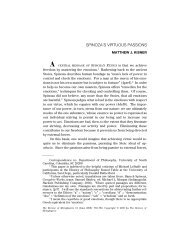heidegger's being and time and national socialism - Philosophy ...
heidegger's being and time and national socialism - Philosophy ...
heidegger's being and time and national socialism - Philosophy ...
Create successful ePaper yourself
Turn your PDF publications into a flip-book with our unique Google optimized e-Paper software.
PHILOSOPHY TODAY<br />
276<br />
tence in §74 in Sein und Zeit (“Die Wiederholung<br />
erwidert vielmehr die Möglichkeit der dagewesenen<br />
Existenz,”[Sein und Zeit, 386]) has been mistranslated<br />
in English, namely, as an act of distancing (oneself<br />
from a comm<strong>and</strong>, request, norm etc. issued by<br />
someone else toward oneself; i.e., as an act of not<br />
complying with a comm<strong>and</strong>, etc.) <strong>and</strong> not as an act of<br />
submission (to a comm<strong>and</strong> etc.) (on “The repetition<br />
makes a reciprocative rejoinder to the possibility of<br />
that existence which-has-been-there” [Heidegger,<br />
Being <strong>and</strong> Time, 438] see Fritsche, Historical Destiny<br />
<strong>and</strong> National Socialism, 10–28 <strong>and</strong> passim; on<br />
Stambaugh’s translation [Being <strong>and</strong> Time: A Translation,<br />
352–53], see Fritsche, Historical Destiny <strong>and</strong><br />
National Socialism, 335–36). I point out, already in<br />
the preface (ibid., ix–x), the importance of this passage<br />
<strong>and</strong> discuss erwidern in the dative (ibid., 7–11)<br />
<strong>and</strong> in the sense of a counterattack or even, as not<br />
only Peg Birmingham interprets it, complete rupture<br />
(as the most intensive form of distancing) (ibid.,<br />
11–2). Immediately thereafter, I introduce, as a further<br />
sense, erwidern as compliance with a request or<br />
submission to a comm<strong>and</strong> (ibid., 12–13), <strong>and</strong> I argue<br />
at length that, in §74, for reasons of the grammar of<br />
the sentence as well as its context erwidern is used in<br />
the sense of such a submission (ibid., 13–28). In addition,<br />
I come back again <strong>and</strong> again to this topic to<br />
substantiate <strong>and</strong> elaborate my claim (e.g., ibid.,<br />
65–67, 83–84, 134–35, 173–74, 327–31n70; see, approvingly,<br />
Dieter Thomä, “Heidegger und der<br />
Nationalsozialismus: In der Dunkelkammer der<br />
Seinsgeschichte,” in Dieter Thomä, ed., Heidegger-<br />
H<strong>and</strong>buch: Leben-Werk-Wirkung [Stuttgart: J. B.<br />
Metzler, 2003], 145–46). I do so because I was aware<br />
that erwidern as submission (to destiny <strong>and</strong> fate) is,<br />
so to speak, the admission ticket to much of the German<br />
right-wing ideology at Heidegger’s <strong>time</strong>, <strong>and</strong><br />
that its mistranslation as an act of distancing—as<br />
which it is interpreted in all postmodern interpretations<br />
<strong>and</strong> even by Charles Guignon (see Fritsche,<br />
Historical Destiny <strong>and</strong> National Socialism,<br />
9–11 <strong>and</strong> passim)—is just a sign of how alien to average<br />
readers in the USA (<strong>and</strong> to Hannah Arendt’s<br />
notion of politics; see ibid., 335n72) this ideology<br />
is— so alien that another reviewer <strong>and</strong> even Elliot<br />
Neaman—who publishes on German literature <strong>and</strong><br />
for whom my book is “the best analysis of<br />
Heidegger’s Being <strong>and</strong> Time to come along in a long<br />
<strong>time</strong>” (Constellations 8:1 [2003]: 155)—has misunderstood<br />
me <strong>and</strong> makes me say what Birmingham<br />
says (ibid., 157), after which what he attributes to me<br />
in the remainder of the review cannot make much<br />
sense. Robert Scharff insinuates that by “revolutionary<br />
rightists” I mean only National Socialists (<strong>and</strong><br />
not also many others, e.g., Max Scheler) <strong>and</strong> makes<br />
me say other strange things (Journal of the History of<br />
<strong>Philosophy</strong> 38:1 [2000]: 455–56). As to my knowledge,<br />
so far no one has challenged, let alone refuted,<br />
any detail of my interpretation.<br />
As I mentioned, most, if not all, of the literature on<br />
the political aspects of Being <strong>and</strong> Time confines itself<br />
to Being <strong>and</strong> Time. It is presumably part of the problem—i.e.,<br />
of the unwillingness <strong>and</strong> incapacity of<br />
trained philosophers, especially in the USA, to take<br />
into account as possibly relevant also literature beyond<br />
the more or less narrow realm of the kinds of<br />
texts they are trained in—that my book has been<br />
characterized most often only as an analysis of the<br />
supposed intricacies of Heidegger’s <strong>and</strong> German language.<br />
It is, however, primarily a comparison of the<br />
political theory in Being <strong>and</strong> Time with contemporaneous<br />
political theories. The parts on Hitler, Scheler,<br />
Lukács, <strong>and</strong> Tillich take more space than the ones on<br />
Being <strong>and</strong> Time.<br />
22. Heidegger, Being <strong>and</strong> Time, 438; Sein und Zeit, 386.<br />
Heidegger labels in Being <strong>and</strong> Time <strong>and</strong> later<br />
“Gewesenheit” (“having-been”) a past that shall be<br />
repeated <strong>and</strong> “Vergangenheit” (“past”) a past that has<br />
no right to be repeated; see Fritsche, Historical Destiny<br />
<strong>and</strong> National Socialism, 284–85n57.<br />
23. Heidegger, Being <strong>and</strong> Time, 444 (replacement of the<br />
indefinite article in front of “possibility” <strong>and</strong> insertion<br />
of the German words mine); Sein und Zeit,<br />
391–2 (see also Being <strong>and</strong> Time, 433; Sein und Zeit,<br />
381; see Fritsche, Historical Destiny <strong>and</strong> National<br />
Socialism, 40–43). See on the importance of the definite<br />
article in German ibid., 238–39n17; on the primacy<br />
of the future see above, n. 21.<br />
24. Heidegger, Being <strong>and</strong> Time, 436 (replacement of the<br />
indefinite article in front of “people” <strong>and</strong> insertion of<br />
the German words mine); Sein und Zeit, 384.<br />
25. Fritsche, Historical Destiny <strong>and</strong> National Socialism,<br />
87, 146–47.<br />
26. Ibid., 138–41 (see e.g. below, n. 99).<br />
27. Ibid., 216–8; Johannes Fritsche, “From National Socialism<br />
to Postmodernism: Löwith on Heidegger,”<br />
Constellations 16 (2009): 93.<br />
28. According to my knowledge, those who, in the<br />
1920s, promoted the community of the people were<br />
already members of the NSDAP or—either they<br />
themselves or, as in the case of Moeller van den
















